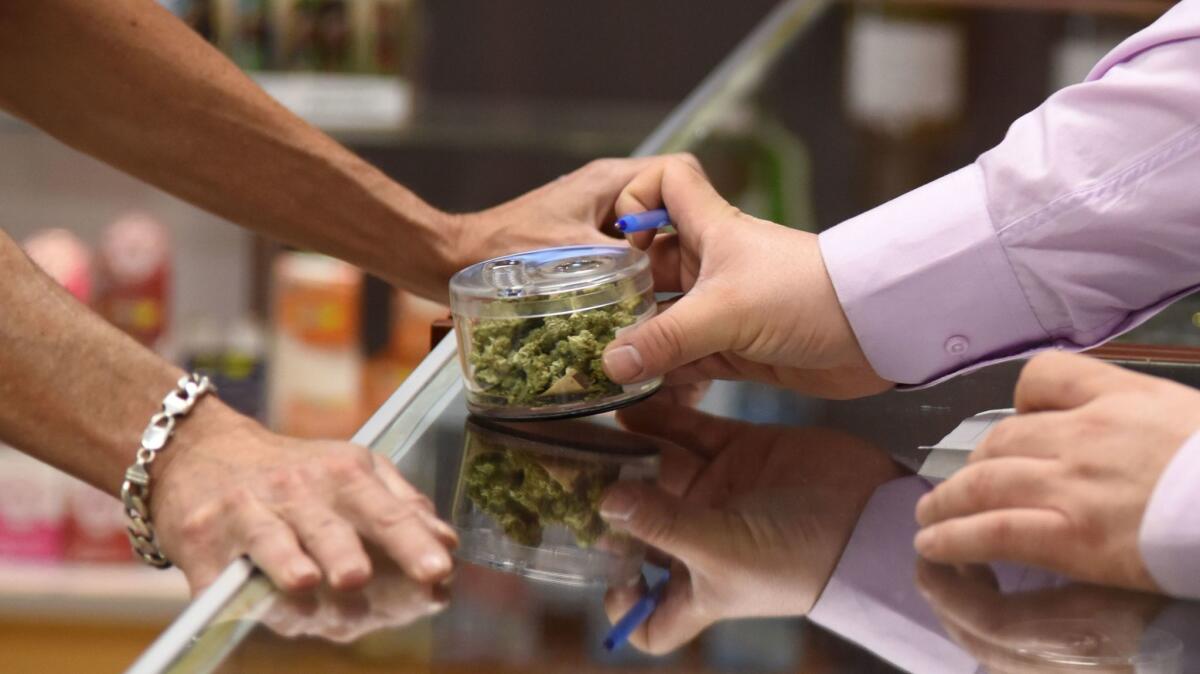Opinion: California will regret legalizing marijuana if its experience is anything like Colorado’s

To the editor: The commercial interests driving the rapid legalization of marijuana in California call to mind the playbook of Big Tobacco. (“For marijuana users, it’s high times as California makes recreational use legal,” Jan. 2)
Decades passed and millions of lives were harmed before the adverse impact of cigarettes was acknowledged. During that time, Big Tobacco stifled government investigation of tobacco’s potential harm while manipulating their product’s addictive properties and marketing to children.
Since the liberalization of marijuana laws in Colorado, more people use marijuana than ever before, and many have or will become addicted. Use of healthcare resources for marijuana-associated illnesses has also increased here.
Colorado is suffering additional consequences, including more car crash fatalities involving marijuana-using drivers and accidental ingestion and poisoning of children who inadvertently consume edibles packaged as candy and soda.
It is predictable, but unfortunate, that financial gain for commercial growers and Silicon Valley financiers have greased the wheels for recreational marijuana. This enthusiasm should perhaps be tempered by the sheer numbers of Californians exposed directly or indirectly to marijuana, where downstream repercussions on healthcare may well be enormous.
Ellen L. Burnham, MD, Denver
The writer is an associate professor and pulmonary disease specialist at the University of Colorado School of Medicine.
..
To the editor: The three letters you published in “California moves into its marijuana future on Jan. 1. Some readers are not eager to make the leap” stated the following concerns about marijuana use, most of which apply equally to alcohol.
Law enforcement does not have adequate test criteria for driving under the influence. While there is no blood-alcohol test for pot, police have many other field sobriety tests, including “walking the line,” reciting the alphabet backward and the “eye and penlight test.” A driver may pass the 0.08% blood alcohol content test and still be arrested for DUI if he or she drives erratically or exhibits slurred speech or other cognitive difficulties.
Pot use poses dangers to other motorists. This applies to alcohol.
Pot use by pregnant women poses dangers to their fetuses. This also applies to alcohol.
Since the benefits and dangers of alcohol and pot use are similar, laws affecting their production, sale and use should be similar.
Bert Bigelow, Orange
..
To the editor: For far too long, our poor, working class and communities of color have been suffering due to unjust criminal persecution for minor offenses like possession of marijuana.
The time for criminal justice reform is long overdue. We ought to divert money from prisons into education and drug recovery programs.
What happened in Portugal after it decriminalized drugs compared with the U.S. when Presidents Nixon, Reagan and Clinton fought their war on drugs is incredibly telling. We need to change our way of thinking and get back to helping our communities, our brothers and sisters, succeed and thrive in this country.
Melissa Veenhuizen, Long Beach
Follow the Opinion section on Twitter @latimesopinion and Facebook
More to Read
A cure for the common opinion
Get thought-provoking perspectives with our weekly newsletter.
You may occasionally receive promotional content from the Los Angeles Times.










